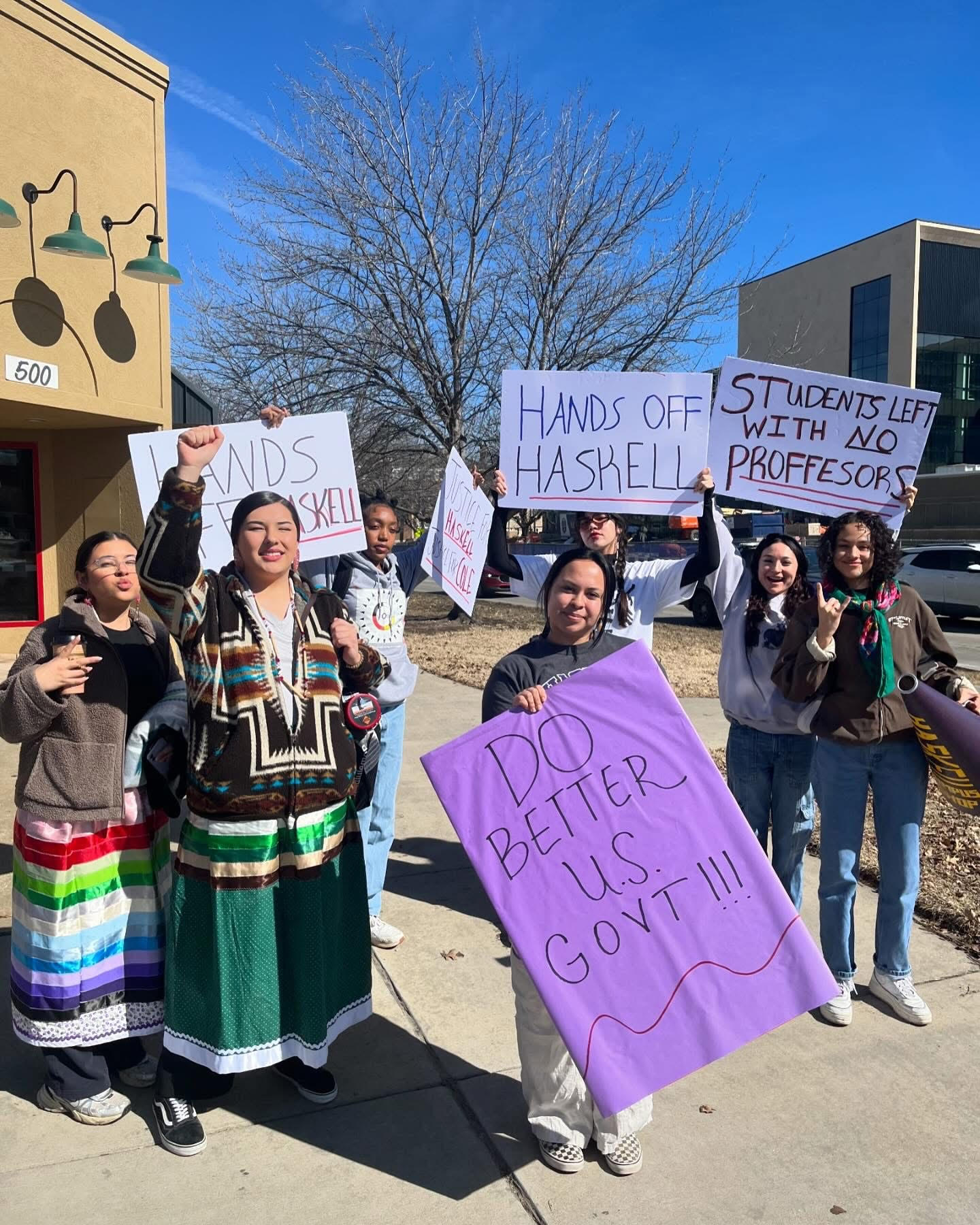
- Details
- By Levi Rickert
An executive order issued on February 14, 2025, terminated the employment of probationary employees—those with less than two years of service.
Haskell Indian Nations University (HINU) in Lawrence, Kansas, has been significantly affected by the reinstatement of Schedule F, a Trump-era policy that reclassifies certain federal positions, simplifying the process of employee termination.
As a result, nearly 40 staff members, including professors, IT personnel, and administrative workers, were laid off. The sudden staff reduction has raised concerns about the university’s ability to maintain its accreditation and continue providing high-quality education and services to students.
The layoffs at Haskell are profoundly impacting the university's student body of over 900, coming in the middle of this academic semester.
On Monday, roughly 40 Haskell students gathered for a rally at the Kansas State Capitol in Topeka, Kansas. Kylie Standingwater (Cherokee/Choctaw Nation of Oklahoma) led the event to raise awareness about the ongoing challenges at Haskell, following the termination of nearly a quarter of the staff. The students selected Topeka as the rally location to gain greater media attention for the situation.
Standingwater, a senior who is majoring in business at Haskell, served as Miss Haskell during the 2023-2024 school year. In addition to her studies, she serves as a tutor to underclass students.
On Tuesday, she spoke with Native News Online for an upcoming Native Bidaské episode.
“Right now the situation is worse than what outsiders think it is. We’ve lost instructors, we’re losing mentors. We’re losing the backbone of Haskell, people that have been here for 25 years and didn’t get their employment federally until a couple of years ago,” Standingwater said.
Standingwater said the Student Success Center where students go for tutoring.
“Students use the center on a daily basis. Having it shut down is going to put a real dent in their educational plans,” Standingwater said. “It is really used by freshmen who have never attended college and don’t know how to deal with the stress of college.”
Standingwater says the American Indian Studies department has been dealt a major blow.
“It’s devastating because culture is one of the reasons students come to Haskell,” Standingwater stated.
At the state capitol on Monday, the students were met with a group that was there to protest in favor of Ukraine. The two groups merged and the Ukraine protestors learned more about the Haskell firings.
Through its history, Haskell has educated Olympians Jim Thorpe (Sac & Fox/Potawatomi) and Billy Mills (Oglala Sioux Tribe). Additionally, Rep. Sharice Davids (D-KS) attended Haskell.
Standingwater is proud of Haskell's legacy and wants the laid off Haskell to get their jobs back so that the university can continue to produce well educated Native Americans who become future leaders.
More Stories Like This
10 Years of Building Business Dreams for Indigenous WomenIchigo Foundation Awards American Indian College Fund Adult Education Program
Bard College Center for Indigenous Studies (CfIS) Hosts Annual Symposium With Keynote Speaker Miranda Belarde-Lewis on March 9–10
American Indian College Fund Announces Spring 2026 Faculty Fellow Cohort
Navajo Nation Signs $19 Million Diné Higher Education Grant Fund Act into Law
Help us defend tribal sovereignty.
At Native News Online, our mission is rooted in telling the stories that strengthen sovereignty and uplift Indigenous voices — not just at year’s end, but every single day.
Because of your generosity last year, we were able to keep our reporters on the ground in tribal communities, at national gatherings and in the halls of Congress — covering the issues that matter most to Indian Country: sovereignty, culture, education, health and economic opportunity.
That support sustained us through a tough year in 2025. Now, as we look to the year ahead, we need your help right now to ensure warrior journalism remains strong — reporting that defends tribal sovereignty, amplifies Native truth, and holds power accountable.
 The stakes couldn't be higher. Your support keeps Native voices heard, Native stories told and Native sovereignty defended.
The stakes couldn't be higher. Your support keeps Native voices heard, Native stories told and Native sovereignty defended.
Stand with Warrior Journalism today.
Levi Rickert (Potawatomi), Editor & Publisher

